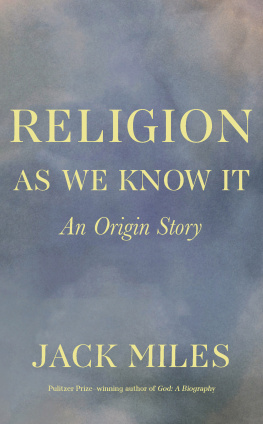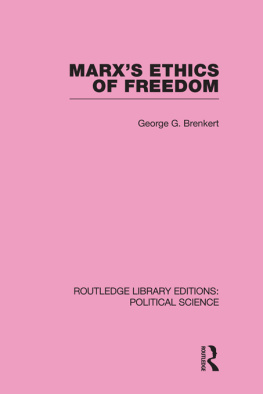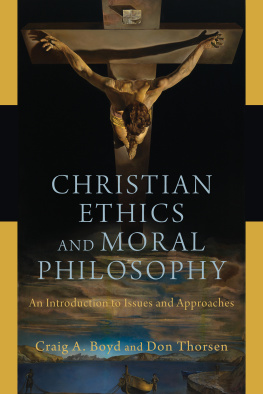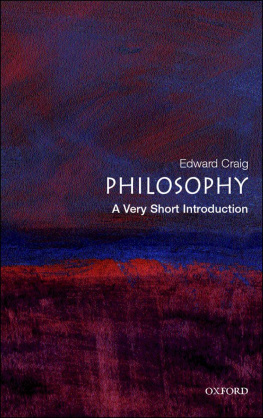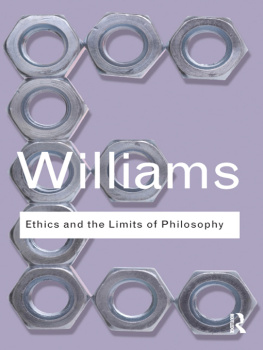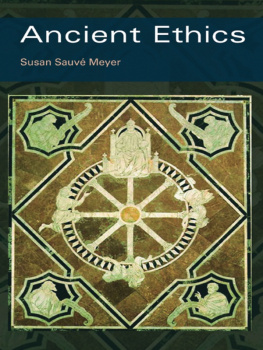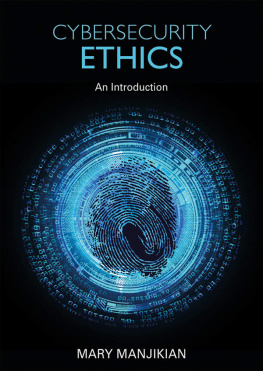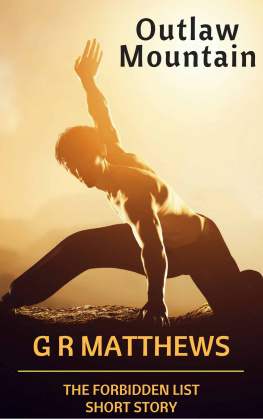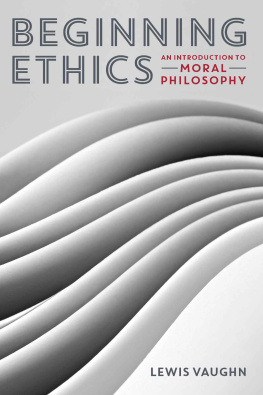George Matthews - Introduction to Philosophy : Ethics
Here you can read online George Matthews - Introduction to Philosophy : Ethics full text of the book (entire story) in english for free. Download pdf and epub, get meaning, cover and reviews about this ebook. year: 2019, genre: Religion. Description of the work, (preface) as well as reviews are available. Best literature library LitArk.com created for fans of good reading and offers a wide selection of genres:
Romance novel
Science fiction
Adventure
Detective
Science
History
Home and family
Prose
Art
Politics
Computer
Non-fiction
Religion
Business
Children
Humor
Choose a favorite category and find really read worthwhile books. Enjoy immersion in the world of imagination, feel the emotions of the characters or learn something new for yourself, make an fascinating discovery.
- Book:Introduction to Philosophy : Ethics
- Author:
- Genre:
- Year:2019
- Rating:4 / 5
- Favourites:Add to favourites
- Your mark:
- 80
- 1
- 2
- 3
- 4
- 5
Introduction to Philosophy : Ethics: summary, description and annotation
We offer to read an annotation, description, summary or preface (depends on what the author of the book "Introduction to Philosophy : Ethics" wrote himself). If you haven't found the necessary information about the book — write in the comments, we will try to find it.
Introduction to Philosophy : Ethics — read online for free the complete book (whole text) full work
Below is the text of the book, divided by pages. System saving the place of the last page read, allows you to conveniently read the book "Introduction to Philosophy : Ethics" online for free, without having to search again every time where you left off. Put a bookmark, and you can go to the page where you finished reading at any time.
Font size:
Interval:
Bookmark:

RELIGION
AS WE KNOW IT
An Origin Story
JACK MILES

W.W NORTON & COMPANY
Independent Publishers Since 1923
For KM and her BF
Gods here?
Who can know?
Not I.
Yet I sigh
and tears flow,
tear on tear.
SAIGY HSHI (11181190)
ON VISITING THE GRAND SHRINE AT ISE
T he United States of America practices many religions, and pluralism in American usage is a term that aims to turn the arguably neutral fact of plural religions into an American value: pluralism. If an American favors pluralism, in other words, then she thinks it good rather than bad that America practices many religions and would regret rather than applaud the replacement of the nations many religions by some one religion, even her own.
Do Americans in fact favor pluralism? Though many surely do, they do so no doubt to a somewhat varying degree. Nonetheless, nearly ten years ago, when newly appointed as the general editor of the American reference work later to be published as The Norton Anthology of World Religions, I chose to assume that American pluralism enjoyed the support of at least a comfortable majority. A majority of Americans, I chose to assume, would welcome a work taking the multiplicity of American religion as not just as a bare fact but also, on balance, as a good thing in our moment of cultural globalization.
I havent abandoned that assumption. Yet as the decision has now been made to publish my general introduction to the NAWR as a separate book, the moment is at hand to reveal how a nagging, complicating background thought both challenged that first assumption in a surprising way and further shaped the work that W. W. Norton & Company eventually published (and that, needless to say, I commend to the readers of this second edition of its introduction).
The Usual Sense of the Word
At the time when Norton approached me about undertaking this work, I had been involved in the study of religion for several decades and had taken part in innumerable public discussions of the subject. What nagged at me was something that had occurred repeatedly in those discussions. Time and again, I had heard someone rise to say that one religion or another is not a religion in the usual sense of the word or not a religion in the mainstream sense of the word. An alternate formulation would sometimes be ___________ is not a religion, its a way of life. Still another would be, ___________ is not a religion, its just a part of being ___________ and a national identifier would then be supplied. Finally, a frequent formulation would be simply ___________ is not a religion in your sense of the word, with the referent of your left quite vague. Whom did the speaker have in mind?
A given speaker might go on to make a perfectly plausible case for why Hopi folk belief and ritual or Shinto or Daoism or some form of Hinduism or even Judaism was misconstrued when taken to be a religion in the usual sense of the word. But who owned that usual sense? Where had it come from? And did it not claim at least enough continuing validity or relevance to bring people of diverse religions together for discussion and debate?
That question did have to be asked, for why assemble people from various religions to talk of any one religion when that religion is then declared not to be a religion in the first place? And what happens to the notion of pluralism if, in fact, there does not exist a plurality of different religions but only a plurality of miscellaneous activities all of which people have for some perverse reason been calling religions? And, by the way, who are these presumptuous people? Where and how did they receive or invent their usual sense of the word? And how has their sense of the word acquired such widespread acceptance that speakers still find it necessary to formally dissociate from it? American culture, by the term pluralism, has clearly embraced the threefold notion that there are, yes, many different religions; that they are all somehow comparable to one another; and, crucially, that they are all more or less welcome in the United States. Has this embrace been all along a huge cultural mistake?
Finally, I had to wonder, when speakers dissociated themselves from the term religion, did the dissociation actually quite work? It often seemed to me that speakers who repudiated the applicability of the word religion to their particular un-religion would later circle back and use the word in spite of themselves in the very sense that they had repudiated. However objectionable, had the word in the usual sense become somehow unavoidable or indispensable?
The phrase as we know it in the title of this book refers to religion as we talk about it. The title thus refers to the very sense of the word religion that I have just now been discussing. Early in my introduction to The Norton Anthology of World Religions, the reader encounters the following deliberately casual and unchallenging sentence:
What is religion? The word exists in the English language, and people have some commonsense notion of what it refers to. Most understand it as one kind of human activity standing alongside other kinds, such as business, politics, warfare, art, law, sport, or science.
My decision for the organization of The Norton Anthology of World Religions was that we would begin with this commonsense notion rather than with a theoretically ambitious definition of religion, an academic definition that I would then be required to impose on my six associate editors, each of whom was far more learned than I about one of the six traditions anthologized. My decision was, first, to acknowledge that various competing academic theories of religion do exist and that they define the word quite differently; second, to note that no theory, no definition, has acquired universal acceptance; but then, third and at length, to proceed to give this very commonsense notion, however academically objectionable it might be, as plausible a history as I could manage, stretching back to its very beginning and forward, at the very end, to the American twentieth century. The result was an origin story, the origin story of this books subtitle.
What makes the everyday American understanding of religion objectionable when extended to cultures very different from the American or European can be traced to the phrase one kind of human activity alongside other kinds. This ostensibly innocuous phrase has an explosive, disruptive potential because it asserts that religion stands indeed alongside the other activities mentionedin other words, that it is separable from and distinguishable from them. But this is just the assertion that turns out to be objectionable when applied to religions (the term immediately comes into question) that are practiced in a way or in a context that makes them indistinguishable and inseparable from business, politics, warfare, law, and so forth down a familiar list of human activities, including even entertainment, not to speak of such larger background realities as language, calendar, marriage, diet, and nationality.
Over the years, those speakers whom I had found most clarifying and instructive, though they may have puzzled me at the time, were those who adopted a stance of disputatious protest against either Christian missionary activity or related Western colonialism and continuing cultural hegemony. Such would be my experience when I would hear an Indian speaker say, What you people call Hinduism is for me just part of being Indian; or when I would hear a Jewish speaker say, Judaism is not a religion, Judaism is a way of life. Hopi religion exists only in the Western Hemisphere, but I once heard a student of that religion say and with good reason, The Hopi do not have a religion in the Western sense of the word.
Next pageFont size:
Interval:
Bookmark:
Similar books «Introduction to Philosophy : Ethics»
Look at similar books to Introduction to Philosophy : Ethics. We have selected literature similar in name and meaning in the hope of providing readers with more options to find new, interesting, not yet read works.
Discussion, reviews of the book Introduction to Philosophy : Ethics and just readers' own opinions. Leave your comments, write what you think about the work, its meaning or the main characters. Specify what exactly you liked and what you didn't like, and why you think so.

